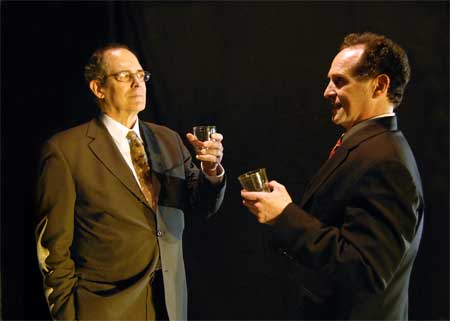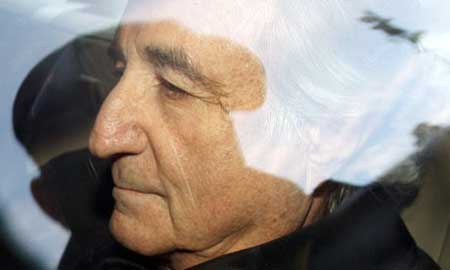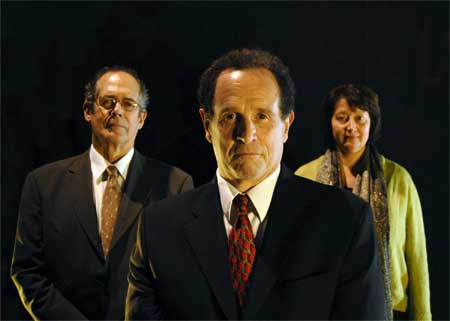Play (2010)
by Deborah Margolin
Directed by Elaine Vaan Hogue
New Repertory Theatre
Arsenal Center for the Arts
Watertown, MA
January 4-26, 2014
With Jeremiah Kissel (Bernie Madoff), Joel Colodner (Solomon Galkin), Adrianne Krstansky (Secretary)

“The Garden of Earthly Delights” (1480-1505)
Prado Museum, Madrid, Spain
For Rip Van Winkle, or anyone else who has been living in a cave or on another planet for the past five years, Bernie Madoff is the long-time Wall Street guru and highly successful manager of an investment company who in 2009 was convicted for one of the largest financial scams in history, a Ponzi scheme of monumental proportions.

Jeremiah Kissel as Bernie Madoff
in “Imagining Madoff”
Photo: Christopher McKenzie Photography
Courtesy of New Repertory Theatre
At the outset, I was not too sure about this play, which features imagined interactions between Madoff and an old Jewish poet and scholar with interspersed pieces of testimony by one of Madoff’s secretaries. At first it felt a bit fragmentary, with each character presenting its case in sequence, and I wondered if it were going to proceed in this collage-like way. My fears were soon allayed by what turned out to be a brilliantly constructed, directed and acted production that featured an ongoing conversation between the two principals.
There is no real plot to this show, save that the conversation between Madoff and Galkin, which provides its substance, is a framework for an animated, intimate and trusted interaction between the two men; we all (except perhaps for you Rip Van Winkles) know how many people attested to what they thought was Bernie Madoff’s deep humanity and reliability before they found out that he was a scoundrel. The play is an incredibly artful delineation of how that trust unfolds, and it describes it without pulling any punches.

Photo: Kathy Willens/AP
The portrait of Madoff is so good, both in the writing and in Jeremiah Kissel’s inspired delivery, that his materialism, obsessiveness and insecurity ride together on a slippery, agitated surface. Brilliantly, writer and actor put together an outline of a high voltage character whose intensity comes out of every pore. The urgency of his demeanor is what is most apparent, and the contrast drawn between his jittery staccato delivery and Colodner’s measured and philosophical characterization of Galkin is fabulously striking.
One of the notable features of Madoff’s obsessiveness in Margolin’s portrait is his sexual drive. She is very careful not to paint him as a sexual transgressor, but simply to note that the overflow of his libidinal energy is an earmark of his general desire to command, control and be in charge of all aspects of his world. That conveyed urgency, combined with his rapid delivery and passionate argumentation puts together a package of a man who works overtime to manage the eruptions of guilt which, though subtle, surface everywhere.
Interestingly, in Martin Scorsese’s recent film, The Wolf of Wall Street, the sexual aspect of financial manipulation gets a big play as well. In the case of Jordan Belfort, the protagonist of that film, the sexuality is crude, open and omnipresent. In Imagining Madoff, it is a much more subtle, but equally significant, factor. Curiously, in both of these cases, the intensity of desire is seen as the vehicle for manipulative behavior. Wanted to be in charge, wanting to be desired, wanting to have either the unspoken (Madoff) or explicit (Belfort) capacity to realize one’s desire is an implicit explanation for the sorts of transgressive power plays both these tragic figures exhibit.
Colodner’s Galkin is just the opposite: reflective, philosophical and interested in Biblical and Talmudic reference as a vehicle for moral analysis. But the author has astutely created in Galkin a character with enough vulnerability to fall potential prey to Madoff’s shenanigans. Colodner shows his earnestness with commanding rabbinic gravitas. Yet his fragility is always apparent, and whether it is a function of his personal experience of the Holocaust or his unworldly need to believe that a familiar and reassuring Jewish financier is ultimately trustworthy, it comes through the gravitas with tragic clarity.

“Portrait of an Old Jew” (1654)
The Hermitage Museum, St. Petersburg, Russia
Jewish themes prevail in this play and are quoted with great efficacy and insight. Whether it involves the wrapping of tefillin – the prayer boxes which are fastened on head and arm during prayer to symbolically bring the spirit of moral law both to one’s judgment and action – which is actually done onstage, or the argumentation over the story of Abraham and Isaac and whether one should trust a God who commands the sacrifice of a child, the invocation of themes is astute and relevant.
How could this Jewish financier, who seemed to carry the trust of so many who in turn took the underpinnings of Judaism seriously, be so bereft of the spirit of that moral framework? The genius of the play is that it conveys Madoff’s familiar and reassuring spirit, which so many took to be the outward symptom of a cultivated Jewish soul, in direct contrast to the deeply skeptical and desperate core which adeptly hid within that composed and familiar exterior.
Not enough can be said about Kissel’s fabulously twitchy, energetic, funny and nuanced portrayal of Madoff. It is such a convincing portrait, not because he is a lookalike, but because he has captured something so significant about the combination of qualities that made Madoff so dangerously familiar and seemingly trustworthy.
Joel Colodner’s Galkin is robust, authoritative and sometimes even funny. He inhabits the role so convincingly that one actually believes he does know each and every book on the wall of the set.
By the way, the set, designed by Jon Savage, is magnificent – a conglomerated sculpture of scholarly and law books rising up from both sides of the stage and forming a celestial arc. It is a great touch, and a great tribute to the underlying themes. Bible, Talmud, civil law, poetry all collide together in a swirl of scholarship that rides up and around these characters.

Jeremiah Kissel as Bernie Madoff
Adrianne Krstansky as a Secretary
in “Imagining Madoff”
Photo: Christopher McKenzie Photography
Courtesy of New Repertory Theatre
Adrienne Krstansky, as a secretary in Madoff’s firm offering testimony to a grand jury, provides accounts in between the Madoff-Galkin dialogues with telling nervous hesitation, a recapitulating reminder of the effect of his actions.
The play is relatively short – an hour and forty minutes, without an intermission – but riveting, consuming, revealing, poignant, and, at times, heartbreakingly funny.
– BADMan
Leave a Reply